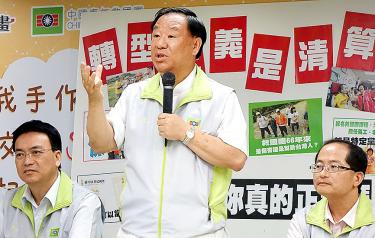The Cabinet’s Ill-gotten Party Assets Settlement Committee yesterday designated the China Youth Corps as an affiliate of the Chinese Nationalist Party (KMT), demanding that the corps declare its assets within four months.
The committee reached the decision after determining that the KMT had controlled the corps’ personnel, operations and finances — the criteria for listing an organization as a party affiliate under the Act Governing the Handling of Ill-gotten Properties by Political Parties and Their Affiliate Organizations (政黨及其附隨組織不當取得財產處理條例).
“In terms of the corps’ personnel, its first director was Chiang Ching-kuo (蔣經國), the son of then-president Chiang Kai-shek (蔣介石) and who later became a KMT chairman,” committee chairman Lin Feng-jeng (林峯正) told a news conference in Taipei, adding that Chiang Ching-kuo’s successor, Li Huan (李煥), also had plenty of experience working in the KMT.
That the corps’ directors were required to deliver work reports to the KMT’s Central Standing Committee before the lifting of martial law suggests that the party had control over the corps’ operations, Lin said.
Citing a KMT Central Standing Committee meeting in 1957, Lin said that after listening to a work report delivered by Chiang Ching-kuo, Chiang Kai-shek, who was also KMT chairman, made some comments that serve as further proof that the KMT had close ties with the corps.
The corps “is affiliated with the Ministry of National Defense and is an important youth organization for the KMT. It should report its work planning and execution to the party headquarters, and receive leadership from the party,” Lin quoted Chiang Kai-shek as saying at the time.
With regard to the corps’ finances, Lin said the now-defunct Taiwan Provincial Government provided the group with land and money in the 1960s and 1970s, while the Ministry of Education funded the corps’ construction of youth activity centers in the 1980s and 1990s.
The corps was established in 1952 by the then-KMT regime to provide basic military training to young men before they were conscripted and it remained under the control of the defense ministry until 1969, an investigation by the assets committee found.
The corps in 1989 registered with the Ministry of the Interior as an independent non-profit civic group, before removing the term “anti-communist” from its Chinese-language name in 2000.
Since its founding, the corps has accumulated total assets worth NT$5.61 billion (US$183.2 million), Lin said, of which NT$970 million is in cash and other liquid assets, NT$2.17 billion is in investment funds, NT$2.41 billion is in non-liquid assets and NT$60 million is in other forms of assets.
The corps has three main sources of revenue: Fifteen youth activity centers, 13 sports centers and 62 cram schools, which last year earned the corps NT$680 million, NT$880 million and NT$1.09 billion respectively, Lin said.
All of the corps’ assets will be frozen and it must declare its assets, he said.
“We will then determine which of the corps’ properties were obtained using the KMT’s ill-gotten assets,” Lin said, adding that the assets committee is to meet with representatives of the corps today to discuss the handling of the case, so as to minimize its potential effects on the corps’ employees.
Blasting the assets committee as a “bandit,” KMT Culture and Communications Committee deputy director-general Hung Meng-kai (洪孟楷) said the corps had never been affiliated with the KMT.
“The committee is using a state apparatus to carry out political persecution. Such actions will not be accepted by the public,” Hung said, calling on organizations and individuals whose rights have been infringed upon by the act to take legal action.
Source: Taipei Times - 2018/08/08





















